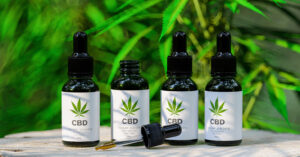CBD: What it is, How it Works, and How it Applies to You
 You may have noticed CBD drops, candy, or beauty products at your local store. CBD has recently become a popular trend and can be purchased as lotions, oils, pills, food, and drinks. Some companies claim it reduces stress, anxiety, inflammation or other health issues. You may be wondering if these claims are real and whether CBD products are safe to use.
You may have noticed CBD drops, candy, or beauty products at your local store. CBD has recently become a popular trend and can be purchased as lotions, oils, pills, food, and drinks. Some companies claim it reduces stress, anxiety, inflammation or other health issues. You may be wondering if these claims are real and whether CBD products are safe to use.
First, let’s talk about how CBD is made. CBD stands for cannabidiol, and it is one of the main compounds found in the cannabis, aka marijuana or hemp plant. The other main compound in cannabis is THC, which contains psychoactive components that make a person high when smoked or ingested. Pure CBD does not have any psychoactive components and comes directly from the hemp plant. The plant is grown, dried, and then the CBD is taken from the stem, stalk, flowers, and leaves. After that, the CBD can be put into an oil, pill, lotion or edible form that can be purchased over-the-counter at places such as drugstores and grocery stores.
Now, let’s break down the science. Our bodies have an internal system called the endocannabinoid system. When CBD interacts with this system, it may alter one’s mood, sleep quality, and other feelings. Because of this, CBD might play a role in a variety of health conditions. Research suggests CBD has properties that help some rare epilepsy syndromes (seizures). In fact, the Food and Drug Administration (FDA) has only approved one medicine that contains CBD, which is for treatment of seizures in children.
More scientific research in humans is needed to support or reject CBD health claims, but there is limited data that shows that CBD might play a role in treating chronic pain, anxiety, insomnia, muscle spasms, IBD/IBS and even certain cancers. Lotion forms of CBD are typically suggested for use with physical conditions such as muscle soreness, while food/drink forms are usually suggested for calming properties related to various mental health conditions such as anxiety. Possible negative side effects of CBD include diarrhea, nausea, fatigue, dry mouth and anxiety. An unsafe reaction to CBD is unlikely, but possible with very high doses. The American Academy of Pediatrics recently released a statement that over-the-counter (medication not prescribed by a doctor) CBD products are not approved for treatment or prevention of any disease.
Legality of CBD varies, so it is important to know the laws of where you live. The FDA does not regulate any supplements, so it is difficult to know if a product actually contains the amount of CBD that the label claims. Products could also contain tiny amounts of THC or other dangerous additives, which can trigger a positive result on a drug test.
There is not enough scientific research to know if CBD is safe or provides health benefits. CBD can interact with some prescription and non-prescription medications, so it is important to tell your medical provider if you are using any CBD products.
-Dietitian Elsey

